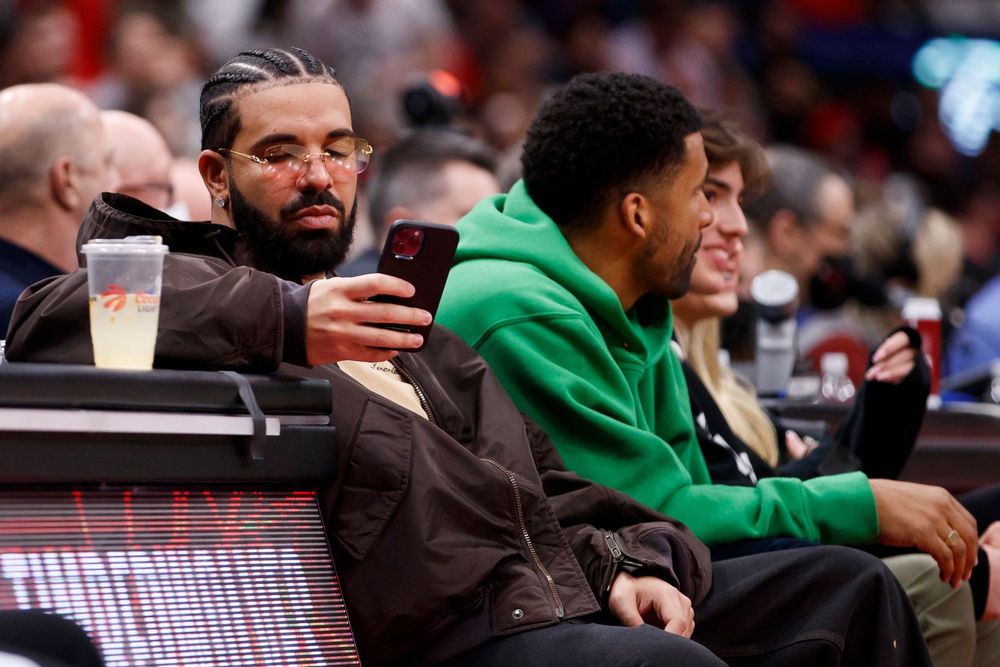Before becoming an all-consuming force of pop culture, Drake was merely an experiment.
At the time the Toronto native released his breakout mixtape So Far Gone 13 years ago, Jay-Z was months away from declaring Auto-Tune dead. Aside from standouts like Lauryn Hill, switch-hitting between singing and rapping was more novelty than norm. Drake made the form of shape-shifting rap his default technique and, in the process, forever dissolved the lines between hip-hop and R&B. In a word, he was daring, and the bet paid off.
And yet, as the old saying reads, even the sun goes down, and your favorite rappers eventually get boring. Some time after 2017’s More Life, Drizzy’s discography became monotonous—a metronomic slog of predictable romance aphorisms, quasi mafioso talk, and pandering hooks rendered with a ruthless, algorithmic precision. In 2020, he released “Toosie Slide,” a formulaic single that rode a TikTok dance and a cute LeBron James family video to No. 1 on the Billboard Hot 100 while leaving some fans behind. Certified Lover Boy did big numbers last year, but even its most popular songs quickly faded from conversation, with “Way 2 Sexy” scanning as musical clickbait. After trailblazing the sound of the 2010s, Drake was operating from a place of security. But with his pulsating new dance album, Honestly, Nevermind, he presents a plot twist that was impossible to anticipate—for better or worse.
Unlike past releases, Drake left no ambiguity about how this one should be classified. In an Instagram post announcing the LP, he referred to it as his “seventh studio album.” This isn’t a playlist, a mixtape, or a collection of demos or loosies. There’s no need for an asterisk; Drake is standing in his fist-pumping truth. As was the case with So Far Gone, his new LP is defined by risk-taking conviction: spurts of house, ampiano, and club music from Jersey and Baltimore. For the most part, his typically charismatic raps are absent. It’s a large-scale departure from what his fans are used to—but are we witnessing a true artistic evolution, or merely a costume (and venue) change?
For years, the prospect of growth has been a throughline for Drake’s critics. But adding new elements is counterproductive when you also abandon your most valuable assets.
Clocking in at 14 tracks with hyper-speed BPMs, Honestly plays out like rave, with Gordo (f.k.a. Carnage) and Black Coffee production keeping the party going. Drizzy previously worked with the latter for “Get It Together,” a standout from More Life. In some ways, that song and “Passionfruit” were precursors to Honestly, which stretches the vibes out over a full album.
At its best, Honestly alchemizes a symbiotic relationship between Drake and the music with which he interacts. For “Sticky,” perhaps the album’s standout, the 6ix God unspools intricate flows atop a labyrinth of Baltimore club rhythms, infusing percussive rhyming with his signature wit. On “Currents,” Black Coffee repurposes screeching bed springs from Trillville’s “Some Cut” for Drake’s sleek and sexy tale of toxic love. Drizzy’s synthesized vocals and vague ruminations melt into the beat, creating a nocturnal bop designed for hitting the dance floor. “Massive” finds Drake coasting over jumpy keys and a sample of a submarine sonar radar; his supple vocals evoke vulnerability while the beat camouflages feelings in late-night thrills.
Still, a well-worn thematic palette—fractured romance, philandering—underscores most of these songs, only here they lack the specificity usually found in his rap verses. Without his usual spurts of witty self-mythology or lengthy verses that highlight his keen observation, we’re left with a Drake album that leans largely on the strength(?) of his singing voice.
When compared to the likes of Doja Cat or Beyoncé—who released a stellar house-leaning single Monday night—that lack of vocal dynamism becomes even more apparent. Songs like “Sticky” and the 21 Savage-assisted “Jimmy Cooks” spotlight the high-wire rhyme dexterity and wordplay that help pull Honestly out of lulls, but they also serve as a reminder of the personality and artistic originality that’s missing elsewhere.
The best genre-switches reimagine music in the image of their performer. When André 3000 sectioned off half of OutKast’s Grammy-winning 2003 double album Speakerboxxx/The Love Below for a primarily sung cross-pollination of psychedelic rock and cosmic funk, he created an inimitable musical statement that also bore new ground. Five years later, Kanye West also set aside rapping, fired up Auto-Tune, and dove into the world of electropop, laying his emotions bare for 808s and Heartbreak, another bold pivot.
You get the feeling Drake is seeking a similar impact, yet beyond the sonics, his lyrics serve up more of the same. He’s still spilling hackneyed truisms, still talking petty to past lovers (“Your mama the sweetest lady, that apple fell far from the tree,” he rhymes on “Liability”). On “Massive,” Drake pleads with all the banality of a toxic Future meme: “When you're ready/We can put this behind us/Baby, we can find us again.”
There’s nothing transformative here; no “Prototype,” no “Say You Will” or “Pinocchio Story.” Instead we get flavorless words and a song called "Texts Go Green." For such an unpredictable musical switch-up, the content, lyrical structures, and vocal tones are anything but, which at times takes the cohesive soundscape from hypnotic to bland. It feels uninspired.
For years, the prospect of growth has been a throughline for Drake’s critics. But adding new elements is counterproductive when you also abandon your most valuable assets. At that point, it becomes a trade, and if you’re not careful, it can be a lopsided one. With Honestly, Nevermind, Drake uses a similar playbook with different players. And instead of the growth so many of us have been yearning for, we’re left with a batch of lukewarm dance tracks—an experiment that bangs a bit before ultimately blowing up in his face.
